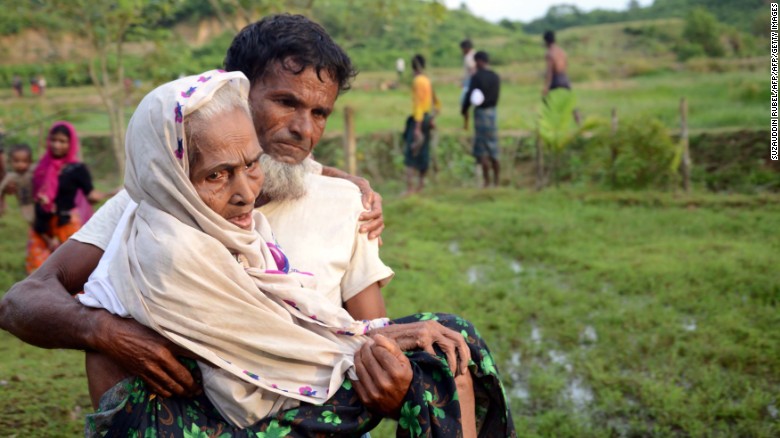Source cnn, 31 Aug
Story highlights
- Thousands flee Myanmar after "clearance operations" intensify on Muslim minority
- Officials say Rohingya militants attacked border posts
(CNN)The bodies of 20 Rohingya Muslims were pulled out of a river Thursday along the border of Myanmar and Bangladesh, across which thousands have fled this week.
As many as 18,500 Rohingya Muslims have fled their homes in Myanmar's Rakhine state since Friday, according to theInternational Organization for Migration.
The exodus began last week after the Myanmar government intensified "clearance operations" following an attack by Rohingya militants on border posts that left 12 security officials dead.
The Rohingya, a Muslim minority in the predominantly Buddhist Myanmar, are considered some of the most persecuted people in the world. Myanmar, also known as Burma, considers them Bangladeshi interlopers, and Bangladesh says they're Burmese.
The corpses of 12 children and eight adults were pulled early Thursday from the Naf River, Ariful Islam, commanding officer of the Bangladesh Border Guard in Teknaf, told CNN.
He said they may have been on a boat that capsized trying to make it across the river to Bangladesh.
"The situation is not good. The Rohingyas are all coming across to escape," he said.
"We can see the smoke on the other side; we can hear the gunfire, they fire very frequently. The intensity of the influx is getting more and more each day."
Thousands of refugees flee across border
Islam said his team of border guards are intercepting Rohingya refugees arriving in Bangladesh to "prevent the illegal intrusion." He estimates they have sent around 1,000 people back to Myanmar since clashes began a week ago.
Myanmar state media reported Tuesday that more than 110 people had died since Friday's "coordinated attacks by extremist terrorists."
While thousands of Rohingya refugees have made it across the border to Bangladesh, thousands of others are stranded in a no man's land between the two countries, the International Organization for Migration said.
The organization said it's unclear how many people have made it into camps along the Bangladeshi border. Aid agencies working in the camps are compiling numbers since there is no registration process for undocumented Myanmar nationals in Bangladesh.
Militants accuse Myanmar of atrocities
On Wednesday, the leader of the militant Arakan Rohingya Salvation Army group accused the Myanmar authorities of atrocities, including killing children and throwing them into rivers, mutilating women and torching houses.
Flanked by two men brandishing automatic weapons, Atah Ullah used a video statement to call on the international community to act and urged Bangladesh to help the thousands fleeing and those stranded in the no man's land, where "many will perish" in the next few days if they don't get help.
He said that the Rohingya community was subject to "atrocities being repeatedly and consistently perpetrated by the Burmese regime."
"Even on this day infants and toddlers were murdered before mutilating their bodies and later disposed of in the water," he said.
"Our women were too mutilated after being chased on the streets." He called on the international community and rights groups to apply pressure on the Myanmar government.
Report: 'Status quo cannot continue'
The violence erupted last week hours after a long-awaited report into the treatment of Rohingya by the Advisory Commission on Rakhine State, led by former UN Secretary-General Kofi Annan.
The report warned that unrest in Rakhine could spiral out of control unless concrete action is taken soon.
"Tensions remain high and they risk becoming worse," Annan said. "The status quo cannot continue."
The UN Security Council held a closed door discussion Wednesday at the request of the United Kingdom to address the escalating violence in Myanmar.
Matthew Rycroft, British ambassador to the United Nations, told reporters resistance from some countries meant a consensus on any action from the world body was unlikely. No joint statement was released.
Rights groups in the region have been critical of Myanmar leader Aung San Suu Kyi, whose National League for Democracy party swept to power in 2015.
"Aung San Suu Kyi has been putting out statements (which are) consistently disturbing, and her office is generating anti-Rohingya, anti-aid worker propaganda, fueling tensions in the country," Matthew Smith, co-founder of human rights group Fortify Rights, told CNN this week.
"As de facto head of state, Aung San Suu Kyi needs to be calling for calm, calling for (the) military to use restraint. (Her) messaging could not be more irresponsible right now."




No comments:
Post a Comment